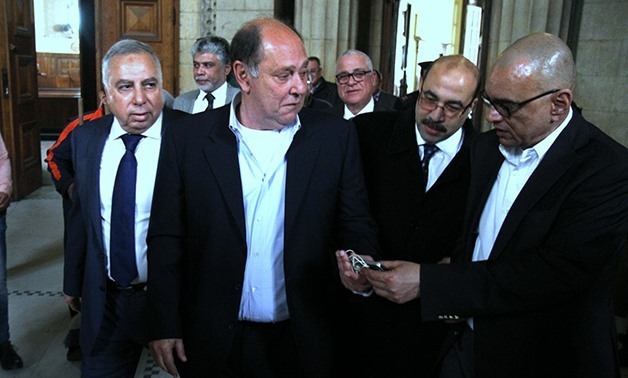
Former Tourism Minister Zuhair Garana - File Photo
CAIRO – 20 June 2018: Cairo Criminal Court accepted the grievance filed by Mubarak’s former Minister of Tourism Zohair Garrana against the decision to ban him from travel.
The former minister faces charges of profiteering and illegally selling state-owned lands in the resorts of Hurghada.
In 2013, Garana was acquitted of all corruption charges. However, the prosecution appealed against the court ruling in 2015, and the Cassation Court ordered Garana's re-trial.
Earlier on June 8, the defense for the former speaker of the Shura Council, Safwat el-Sherif said el-Sherif, gave up four pieces of land in Fayed City in Ismailia governorate, worth LE 44 million ($2.5 million), seeking reconciliation with the government, a high official source told Egypt Today.
According to a memorandum submitted by Sherif’s defense to the Criminal Court, the Ministry of Justice and Attorney General obtained LE 179 million from Sherif out of LE 304 million, obligating him to pay only LE 124 million at the moment.
The defense previously submitted official papers proving that all the procedures taken in dealing with the properties of Sherif and his family members are legally accurate.
The court canceled in 2017 the decision to jail Sherif for five years, adding a fine of LE 2 million. The court also decided to restart the trial again in another court.
The Reconciliation Law amendment of Article 18B of the Criminal Procedure Law, issued in October 2015, stipulates that it is permissible to reconcile with defendants accused of criminal offenses and misdemeanors punishable by law after payment of a fine; the government would receive smuggled money in exchange for dropping the charges the defendants face.
New amendments to the Illicit Gains Authority Law, passed during 2015, gave defendants listed in the assets-freeze an opportunity to reconcile with the state. It was mentioned that in return for reconciliation with the state, all charges against them would be dropped.
The new amendments presented a good opportunity for several Mubarak-era figures and businessmen; however, not all of them succeeded to meet the criteria set by the state.
In June 2017, former Trade Minister Rashid Mohamed Rashid, whose assets were frozen upon investigations, returned to Egypt from Italy after reconciling with the government.
In March 2017, Rashid’s lawyer, Ashraf Abul Kheir, said in statements to Egypt Today that the Egyptian authorities had lifted the freeze on the assets of his client and his family – both inside and outside Egypt – and his name was removed from the travel ban list.
Abul Kheir confirmed that Rashid will be able to return to Egypt any time and can travel freely.
All criminal charges against Rashid were dropped following a reconciliation deal with the government that was approved in November. The deal required Rashid to pay nearly LE 500 million ($28 million) to the government.
Also, in July 2017, Spanish-Egyptian businessman, Hussein Salem, arrived in Cairo from Spain after reaching a reconciliation agreement with the government. He was accused of profiting from his relationship with ousted President Mubarak and exporting gas to Israel for less than the global price in order to achieve personal benefits.
The Egyptian authorities had announced reconciliation with Salem under the condition that he gives up 75 percent of his properties, which are worth more than LE 5.8 billion.
According to data released by the IGA, 37 out of 93 requests for reconciliation deals from businessmen, investors, Mubarak regime figures, and former public servants have ended in settlements since the legal amendments to regulate cases involving the misuse of public funds or illicit gains were introduced in 2015, according to Al Ahram Weekly.
According to the IGA, the state has reclaimed LE 5.677 billion in settlements other than that of Salem.
Many politicians and human rights advocates criticized the Reconciliation Law, asserting that reconciliation with these figures undermines the rule of law. They wondered how people who embezzle public funds can simply get away with their crimes through paying money.

Comments
Leave a Comment